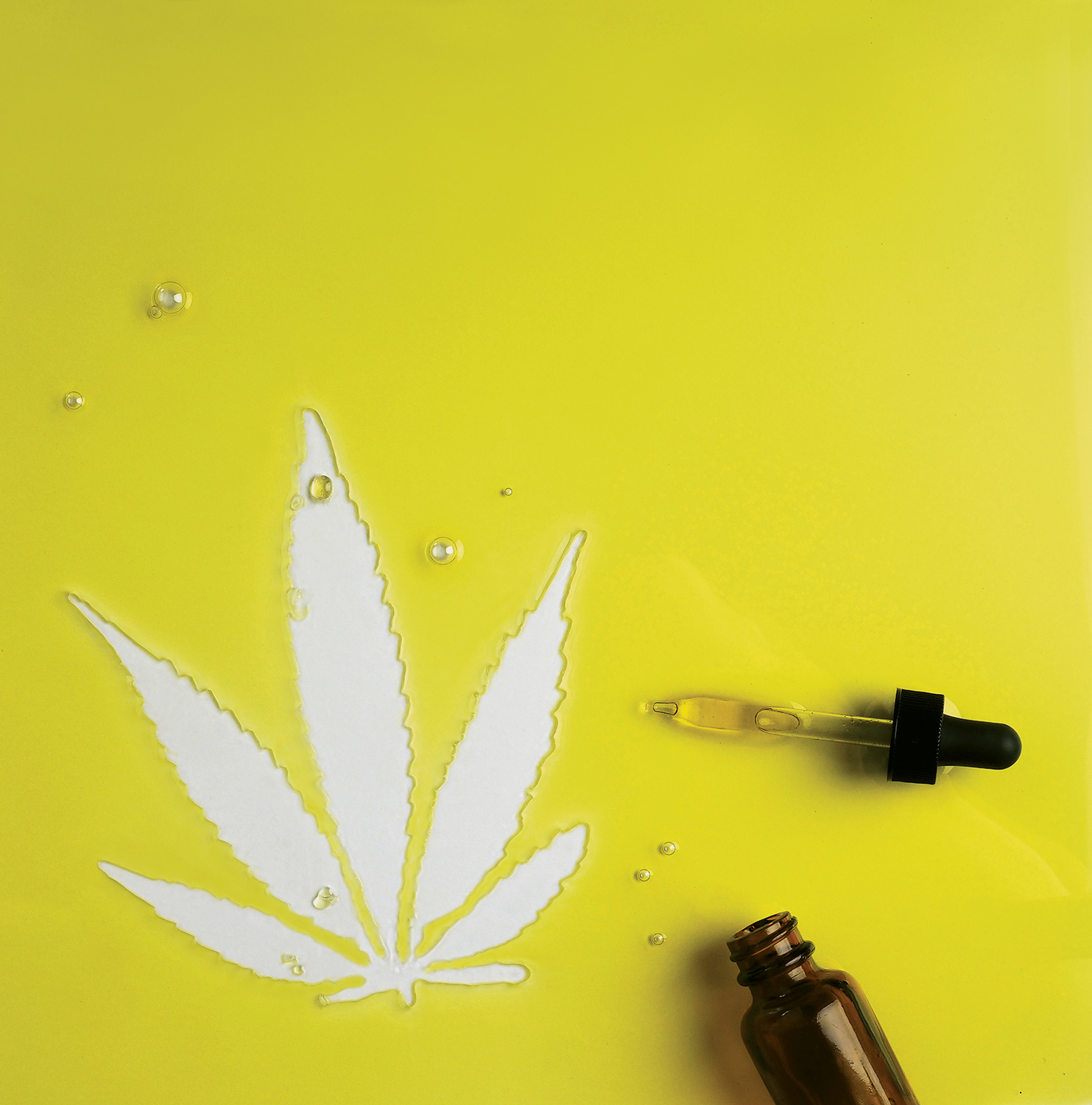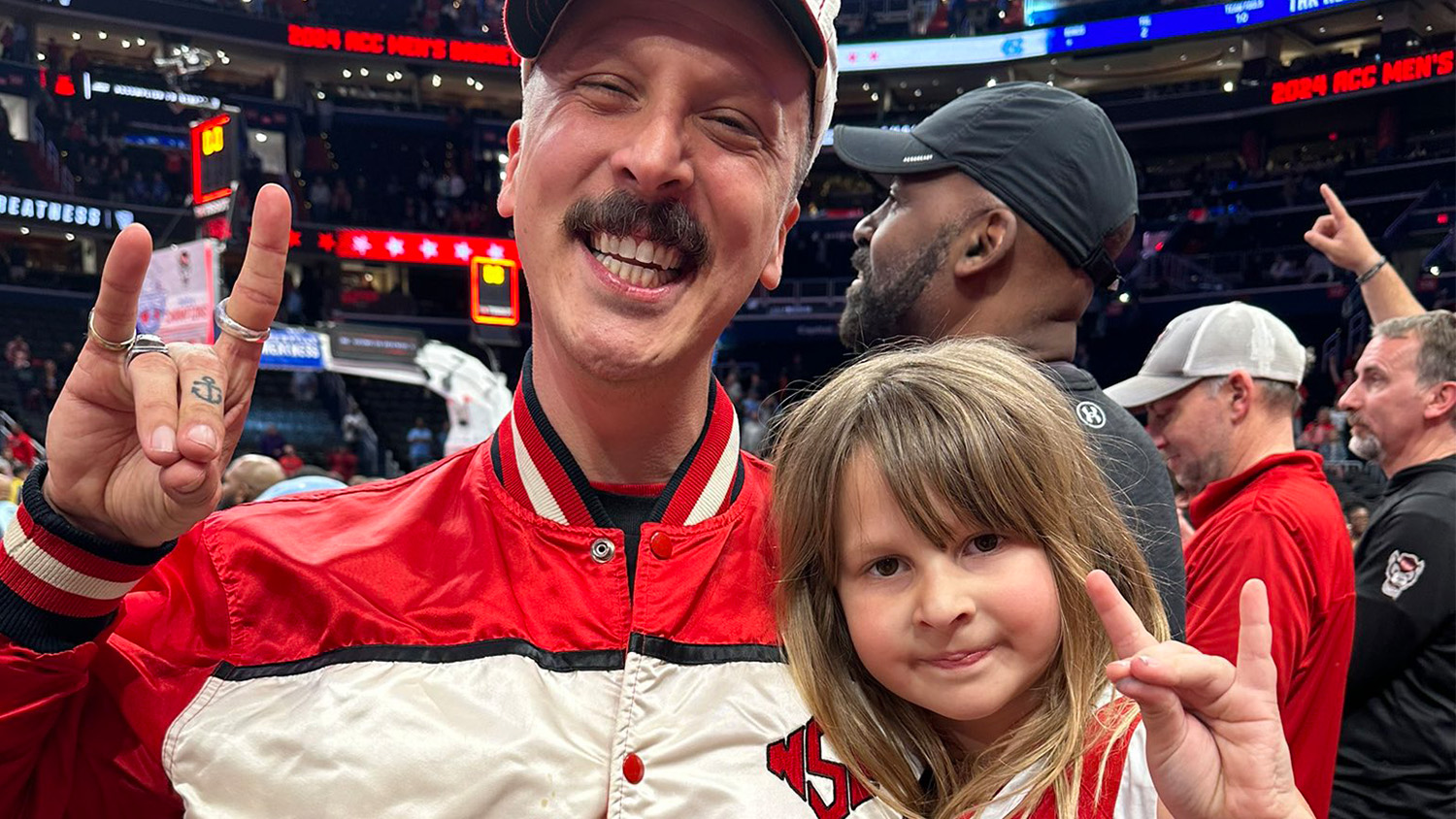
Risky Business
Some North Carolina farmers are betting the farm on hemp, and NC State is helping hedge their bets.
By Mary Cornatzer | Photography by Simon Griffiths ’85 and Marc Hall, NC State
On a chilly morning last fall, machines clanked and the smell of dried tobacco was in the air on Randy Edwards’ farm in eastern Wake County. In a large metal barn, a half dozen workers were pitching dried leaves onto a conveyer belt that carried them to a machine that pressed them into bales. It’s a scene that has played out on Edwards’ farm for decades. But this year, Edwards had only planted half as much tobacco as usual — 500 acres instead of 1,000 — in part because China, in the middle of a trade dispute with the U.S., wasn’t buying.
But a row of small steel barns contained what he hoped what be an insurance policy. Instead of tobacco, the barns were drying hemp. Edwards planted 30 acres of hemp this year as an experiment — one that more and more farmers throughout North Carolina, and the nation, are undertaking. There’s been talk that hemp could be North Carolina’s next cash crop, and the Edwards family is waiting to see how much the hemp harvest will bring in. “I haven’t seen a reward yet,” says Edwards’ son, Simon. “But the talk is pretty nice.”

Hemp can be grown for its seed, its flowers, its leaves and its stalks. You can eat it, wear it, bathe with it, and its fibers can be used in construction material. But much of the boom in hemp farming is due to demand for products that contain CBD oil, which some credit with relieving everything from pain and anxiety to insomnia. In North Carolina and across the country, stores with names like the Hemp Farmacy and Nature’s Releaf Hemp Store have popped up, selling CBD capsules, ointments, hemp-infused chocolate, gummy bears and even pet food.
CBD products became wide-spread after 2018, when Congress made it legal to grow hemp and sell hemp-derived products. The FDA has not weighed in on any potential benefits, and has said more study is needed to ensure that CBD does no harm. Meanwhile, anecdotal, non- scientific reports that the products have value have kept up consumer demand, even though the products can be expensive (a bottle of 30 capsules can set you back $65). Farmers quickly saw the potential, and last year, more than 1,400 farmers in North Carolina were licensed to grow hemp.
With the market exploding, NC State’s researchers and agricultural extension agents are front and center, helping farmers navigate how to grow, transplant, fertilize and harvest hemp. They’re also branching out and offering help on regulatory and legal challenges specific to hemp.
That can include advice, for example, on shipping. NC State’s hemp extension website includes information on subjects like pre- venting root rot and mold, along with a post from a researcher who wrote, “This morning I received a phone call from a sheriff who had been called to a United Parcel Ser- vice (UPS) facility because a pack- age smelled like marijuana.” The post reminded farmers that the crop can only be shipped through the U.S. Postal Service, and added that the sheriff suggested packing everything in airtight containers. “Do not try to hide the odor with coffee grounds, dryer sheets, and the like. That just raises suspicion!”
Hemp not only smells like marijuana, it looks like it. Both are the species Cannabis sativa. Hemp has a lower concentration of THC (tetrahydrocannabinol), which is what gives people the sensation of being high. In other words, you can smoke hemp but you won’t get high.


The distinction is important for hemp farmers, who must have a sam- ple of their hemp crop tested every year for THC. If the level is too high — above 0.3 percent — the entire crop must be destroyed. Farmers must get a license from the state Industrial Hemp Commission to grow hemp — and they have to certify they have no drug-related convictions. Because law enforcement is interested in anyone growing a field of marijuana, the growers must also provide GPS coordinates for the plot where they plan to grow hemp, so that the legal crop won’t be mistaken for an illegal one. (In 2018, a farmer’s hemp crop was seized and destroyed because he had not notified the state that he had changed the location of the plot.)
But for many, the challenges may be worth it. And it turns out the crop is a good fit for tobacco growers, says Keith Edmisten ’81, ’85 ms, a professor of crop and soil sciences and a cotton extension specialist. Tobacco growers have cultivators and transplanters, which are needed to transplant hemp seedlings, and know how to use them. “They have the barns to dry it,” Edmisten says. “They know how to get laborers.”
The industry surrounding hemp in North Carolina includes nurseries that propagate the plants, companies that test for THC, processors that turn the hemp into oil and wholesalers and retailers who bring CBD-infused products to eager buyers. The Hemp Business Journal expects the market for hemp-based CBD nationally to be $646 million by 2022; that’s up from $190 million in 2017, and expects the overall market for hemp products to be $1.9 billion by 2022.
Budding Enterprise
Randy Edwards unbars the doors on one of the small barns and opens them wide. Hanging inside are rows of brown stalks packed with buds. He reaches in, grabs a small clump and pulls it apart, crushing it a bit, before offering it up for a sniff. The aroma is unmistakable to anyone who’s ever been to a rock concert or perhaps a college dorm room.
“Some of the boys say it reminds them of the ’70s,” Edwards says with a grin.

His family has been farming in Wake County for generations, and when Edwards decided to grow hemp, he turned to the same place he’s turned for years for advice on tobacco — NC State’s Cooperative Extension Service. Tom Melton ’78, ’80 ms, who recently retired as deputy director of Extension, says much of the work on hemp is simi- lar to research done on other crops. Farmers want to know which varieties are the best to plant, how to control disease and insect problems, which plants grow better in the Piedmont or the Coastal Plain.
But with hemp, farmers also need to know how to grow plants that produce a lot of CBD oil but are low in THC — low enough that they won’t risk having their crop destroyed. Last year, about 10 percent of the hemp crop in North Carolina had to be destroyed because the THC
concentration was too high.
1,404
licensed growers in North Carolina as of 2019
6.9 million
licensed greenhouse square feet in North Carolina
NC State researchers tell farmers that stresses on a plant — such as too much or too little water — can cause the THC levels to spike. They’re also looking at different varieties of hemp to see which ones are most likely to have a low THC content but still produce CBD oil. Angela Post ’04, ’05, ’08 ms, a small-grains Extension specialist, conducted field trials last summer testing 29 varieties of hemp on farms and field stations around the state to find out which ones work best. Grant Ellington, an Extension assistant professor who helped the Edwards family grow tobacco, is now focused on helping the family grow hemp. He’s looking at the drying process, including how much gas and electricity is required, and how high the temperature can go. “The higher the temperature, the faster we can empty the barn,” he says, but adds, “The fundamental question is, what effect does the temperature have on the quality? Would it reduce the [CBD] oil content?”
High Risk, High Value
Some farmers went into hemp thinking it was going to make them millionaires, but now realize that won’t be the case, says David Suchoff ’15 ms, ’18 phd, a crops Extension specialist. “You can’t expect to grow it and be set for life,” he says. “Just like growing corn or soybeans or tobacco, it’s going to be another great crop to add to your overall crop diversity.”
Hemp is a high-value crop, meaning it is expensive to grow but has a greater potential return. Melton says the expense is roughly $10,000 to $15,000 an acre, but the return can be between $25,000 and $35,000. “It’s more in line with some really high-value fruits and vegetables than it is even tobacco,” he says.
Suchoff sees potential in CBD, hemp fiber and grain. He plans to do research this summer to see which fiber varieties do well in North Carolina, and take his findings to the Wilson College of Textiles to determine the quality of the fiber. “I keep telling people North Carolina is perfectly situated for the hemp fiber industry because we have the best farmers to grow it, and we have a very deep and rich textile history,” he says.
Growing for fiber would be fine with Randy Edwards. Anything to keep the farm going, he says, and he’d like to see his grandkids be able to work the land. The first hemp crop did well. In fact, it did so well that the field began to attract attention.
By early August, the plants were about 8 feet tall and 3 to 4 feet round at the bottom, and starting to bud. “You could get lost in them,” says Simon Edwards. He had expected to lose a few plants here or there — but then people started yanking up stalks and stuffing them in their cars. He says he realized these weren’t locals hoping for a high, but more likely dealers who wanted the hemp as filler.
So he did something he’s never had to do for a tobacco crop — hire a guard for the fields.
- Categories:


